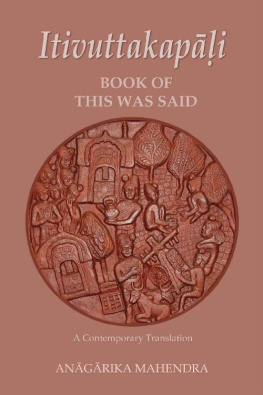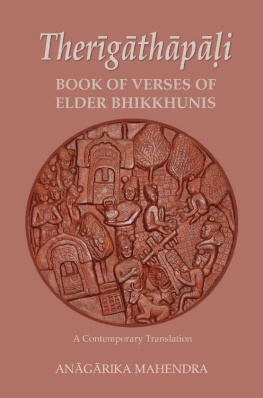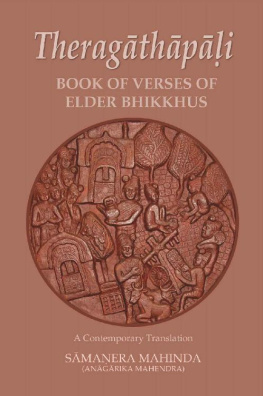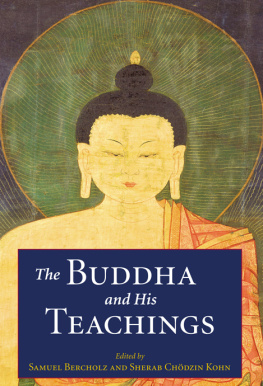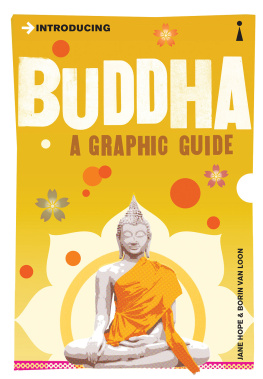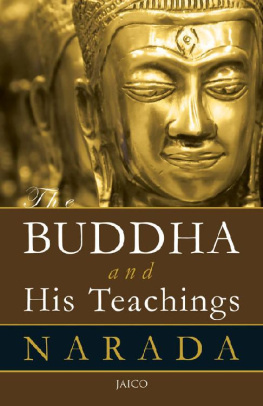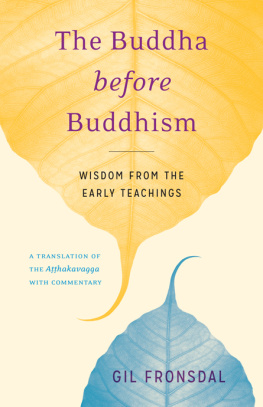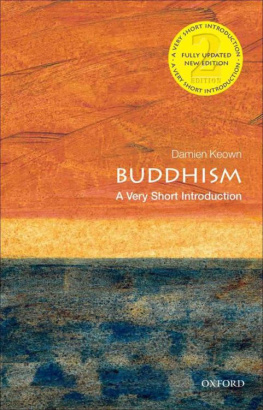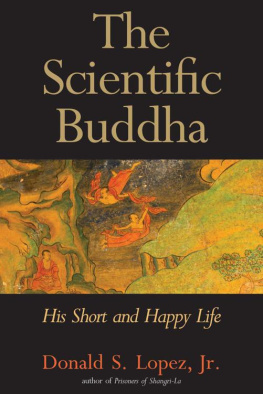Khuddakanikye
In the Minor Collection
Itivuttakapi
Book of This Was Said
A Contemporary Translation
Angrika Mahendra
Library of Congress Preassigned Control Number: 2018940458
Edition 1A 2018
ISBN: 978-0-9990781-1-2 Paperback/Softcover
2018 Dhamma Publishers
Roslindale, MA, USA
For free distribution only
You may reprint and redistribute this work in any medium,
provided that you: (1) charge no fees for its distribution or use, (2) dont make any change to the contents including layout, (3) include the entire contents from front-cover to back-cover (with the exception of changing inside back-cover to record new donors), (4) include this entire page as notice, and (5) send us a copy of the book as published.
Before reprinting and redistributing, please inquire at if a newer edition is available.
Otherwise, all rights reserved.
Cover: Anthapiika donating Jetavana to Lord Buddha, Bharhut Stupa, Indian Museum, Kolkata, India
As this is a dhamma book, please treat it with respect. When you no longer need it, please donate it to your local Buddhist Society or local Library. Thank you.
Dedication
To my parents, with gratitude

Bhikkhus, there are two persons that cannot easily be repaid. What two? Ones mother and father. Even if one should carry about ones mother on one shoulder and ones father on the other, and [while doing so] should have a life span of a hundred years, live for a hundred years; and if one should attend to them by anointing them with balms, by massaging, bathing, and rubbing their limbs, and they even void their urine and excrement there, one still would not have done enough for ones parents, nor would one have repaid them. Even if one were to establish ones parents as the supreme lords and rulers over this great earth abounding in the seven treasures, one still would not have done enough for ones parents, nor would one have repaid them. For what reason? Parents are of great help to their children; they bring them up, feed them, and show them the world. (NDB 2.33)
Bhikkhus, there are these three things prescribed by the wise, prescribed by good people. What three? (1) Giving is prescribed by the wise, prescribed by good people. (2) The going forth is prescribed by the wise, prescribed by good people. (3) Attending upon ones mother and father is prescribed by the wise, prescribed by good people. These three things are prescribed by the wise, prescribed by good people. (NDB 3.45)
Mother-father are brahm, said to be the first teachers;
Worthy of gifts by children, compassionate for offspring. (ITI-A 106)
Gratitude
I take this opportunity to thank all the kalyn mitt who have introduced me to the dhamm, helped me understand it, and encouraged me all along. All the dhamma preachers and writers have helped me enormously in learning the multi-faceted dhamma thru their preachings, talks, and writings. The clearly understandable and meaningful dhamm contained herein is due to them all errors and misunderstandings are mine alone.
Special thanks are due to Venerable Bhikkhu Bodhi who clarified the standard opening, middle, and closing statements as well as jogged me back to reality by reminding me of not having to standardize everything truly, middle path is the way to go.
My Pi teacher Mr. Mediwake, even while himself being in poor health, meticulously went thru the glossary and helped correct my misunderstandings. Venerable Mahawela Rathanapala provided detailed constructive feedback that resulted in many improvements.
Big thanks are due to Mr. Senarath Udurawana who was the first person I met in Sri Lanka and ever since then, he has always been there to help with everything whether driving to a monastery, cleaning the kui, or distributing the dhamm books.
I would like to thank Ms. Samanthi Rambukpotha and her parents Mr. and Mrs. Tillekeratne for their kind dna by providing their home in Ratemulla, along with all necessities, for a serene environment conducive to meditation and translation. The first draft of this book was completed while I stayed in Ratemulla, Kandy in 2017. The book as printed was finalized while I stayed at Sumathipla Araa, Kanduboda, Sri Lanka under the tutelage of Venerable Bhante Pemsiri.
Thanks are also due to VRI-India, and in particular to Mr. S. P. Goenka, for their gracious permission to reproduce the CST edition Pi source text in the book. Gratitude is expressed to all the monasteries and meditation centers that have willingly taken on the task of distributing this book.
Mr. Nalin Ariyarathne has done a superlative book and cover design, and thanks are due to Ms. Pooja Gokul for the permission to use the Sanchi Torana sketch in the back cover logo. Ajith Printers of Boralesgamuwa, Sri Lanka has done an excellent job of producing a fine book.
May they all share bountifully in the merits of this translation. May all beings partake of the merits generated of this work. May all beings be happy, be peaceful, be liberated.
Sumathipla Araa, Kanduboda
Sri Lanka
April 2018
Guide to Pi Pronunciation
The Pi Alphabet consists of:
Vowels:
- a (as in cut or us)
- (as in ah or art)
- i (as in king or is)
- (as in keen or eel)
- u (as in put)
- (as in rule or boon)
- e (as in way or end)
- (as in home or ox)
- e and o are long before a single consonant (me & bone)
- e and o are short before a double consonant (end & ox)
Consonants:
- Gutturals: k, kh, g, gh,
- Palatals: c, ch, j, jh,
- Cerebrals: , h, , h, (tongue on roof of mouth)
- Dentals: t, th, d, dh, n (tongue behind upper teeth)
- Labials: p, ph, b, bh, m
- Semivowels: y, r, , l, v
- Sibilant: s
- Aspirate: h
- Niggahta: (like ng in song)
- Among the consonants, g is always pronounced as in good, c as in church, as in onion.
- The aspirates kh, gh, ch, jh, h, h, th, dh, ph, bh are single consonants pronounced with slightly more force than the non-aspirates, thus th as in Thomas (not as in thin), ph as in puff (not as in phone).
- Double consonants are always enunciated separately, thus dd as in mad dog, gg as in big gun.
- An o and an e always carry a stress; otherwise the stress falls on a long vowel , , , or on a double consonant, or on .
(Courtesy Venerables Balangoda nanda Maitreya and Bhikkhu Bodhi)
Bibliography and Abbreviations
CDB Bodhi, Venerable Bhikkhu; The Connected Discourses of the Buddha: A New Translation of the Sayutta Nikya (Teachings of the Buddha) Wisdom Publications. Kindle Edition.
CST Chaha Sagyan Tipiaka 4.0.0.15 Electronic Edition copyright 1995 Vipassana Research Institute.
See Endnote 1 for abbreviations used by CST in Pi text.
DHP CST Dhammapada
Online Dictionaries
DICT-P (1) PTS Pi-English Dictionary http://dsal.uchicago.edu/dictionaries/pali/
DICT-S (2) Sanskrit http://andhrabharati.com/dictionary/sanskrit/index.php#ws-1
DICT-W (3) Wisdom Library http://www.wisdomlib.org/
DPPN Malalasekera, G. P.; Dictionary of Pi Proper Names (Online Version: http://what-buddha-said.net/library/DPPN/index_dict.ppn.htm )
GDB Venerable Nyanaponika; Hecker, Hellmuth; Great Disciples of the Buddha: Their Lives, Their Works, Their Legacy (Teachings of the Buddha) Wisdom Publications. Kindle Edition.
ITI-A Angrika, Mahendra; This was Said: A Contemporary Translation, Dhamma Publishers. Kindle Edition.
ITI-I Ireland, John D.; Itivuttaka: This Was Said by the Buddha; BPS 2007 (PDF Edition).

